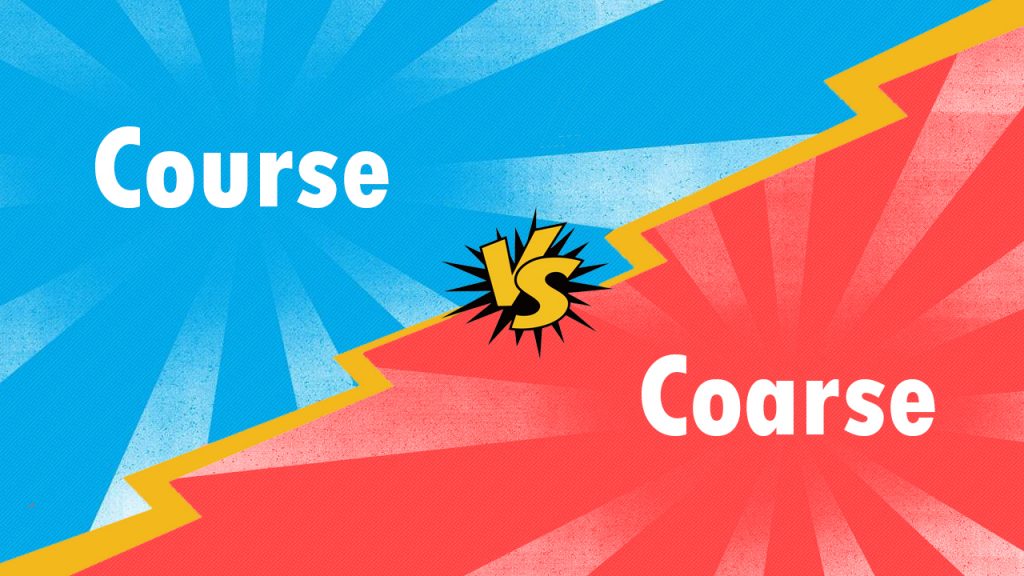When the English language contains many homonyms, homographs, and homophones, it’s only natural that some people get confused.
For example, the words “course” and “coarse” are two words with very different meanings, but because they are homophones (words with different meaning and spelling but similar pronunciation), it’s possible for some people to use the wrong word when putting it into writing. They could end up saying that sand is “course” or that they were treated to a dinner with five “coarses,” which doesn’t make a lot of sense.
Course vs. Coarse
In the case of course and coarse, one of these is an adjective while the other can serve as a noun or verb. The term “course” dates back to France in the 1300s with the Old French word cors, which is the forward motion along a path usually used to describe the flow of a river. It was also used a number of other definitions, hence its multiple meanings today. “Coarse,” on the other hand, originated from the late Middle English and its origins before that were uncertain.
Course
The word “course” can be used as a noun (which, in turn, has plenty of uses) and a verb. As a noun, it can mean a lot of things, including:
- A part of a meal (“The wedding had a luxurious seven-course meal.”)
- A track or route (“The navigation system plotted a course for the fastest route to the house.”)
- A venue usually meant for sports (“Your father is playing somewhere on the gold course.”)
- A lecture or guide on a certain academic subject (“Through Education offers plenty of courses on grammar.”)

It’s up to the reader or listener to use context clues and understand which one of these noun definitions are most appropriate for the scenario. As a verb, however, it only has one meaning: the original French usage of how liquid flows through. It can be used figuratively, like when you say a father’s blood runs through his child’s veins, and it can be used literally, like when you describe the swiftness of a coursing river.
A few more examples of the use of the word course:
- She is studying business courses at the university.
- The course was dangerous but was every professional biker’s dream.
- The ship was on course for its next destination.
- For the main course, the host served duck confit with rice.
Coarse
A younger word in the English language, the word “coarse” is only an adjective meaning something rough, thick, and sparse – usually something of low quality from materials like fabrics or fur. During its early use, it was meant to describe something that was of ordinary or inferior quality.

For example, you can say that someone with a thick head of hair has coarse hair. Or when you’re cooking and prefer the flavor of rock salt and crushed black pepper over iodized salt and finely ground pepper, you can say that you season your meat with coarse rock salt and coarse pepper. Here are some other examples:
- Refrain from using coarse apricot scrub on your face’s sensitive skin.
- I don’t like sand. It’s coarse and rough and irritating and it gets everywhere.
- The prisoner was only given a coarse tunic and pants to wear.
Another less common way people use “coarse” as an adjective is to describe someone who is rude, vulgar, or acts socially unacceptable in certain cases. When someone reprimands you for your coarse language, they want you to tone down the vulgarity, cursing, or whatever they think is very unbecoming in your language. Other ways of saying it in this context include:
- The politician’s coarse language during the press conference landed him in hot water.
- Expect comedians to be very coarse when they start their roast.
- The man was too coarse with his words and actions and was escorted out of the club.
Recap: Difference Between Course & Coarse

Let’s recap: course can be used as a noun with many definitions and one verb, while coarse is only used two ways, both as adjectives. To help you remember, look at its spelling and the differences they have: the word coarse has the letter ‘a,’ which can stand for adjective. If you’re using the word as an adjective, use “coarse.” But if you’re using it for one of its many definitions as a noun or verb, use “course.”
Let’s see if you’ve understood the lesson. Try filling in these blanks with the appropriate word.
- Not everyone can laugh at Mike’s ______ sense of humor.
- Jacob did not like the entrée, but he did enjoy the _______ served after that.
- Elmer enrolled in a typing _____ to help improve his resume as an administrative assistant.
- Body scrubs are supposed to be ______, Janet. That’s why they’re called.
- Seeking a more dangerous path, Logan veered off the ______ and went to explore the other side of the mountain.
Answers:
- Coarse
- Course
- Course
- Coarse
- Course
















